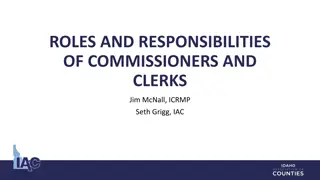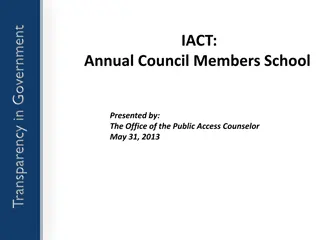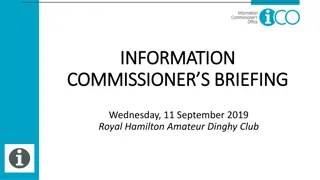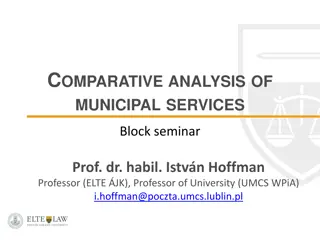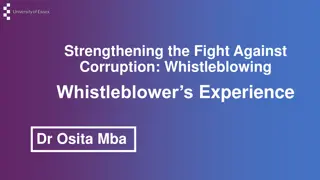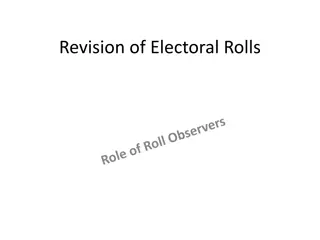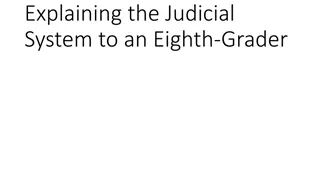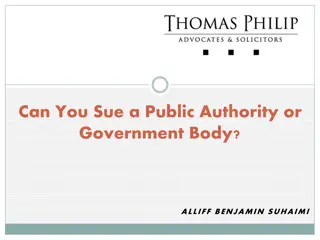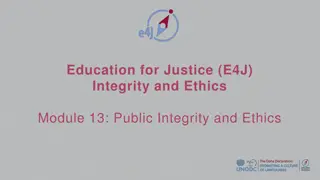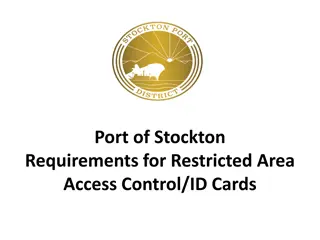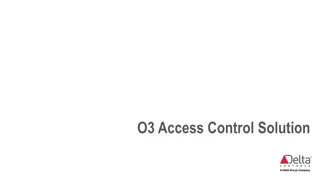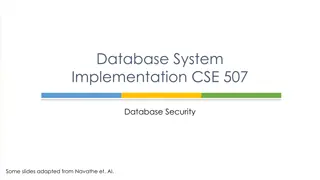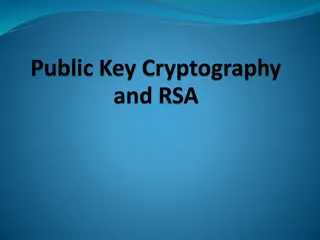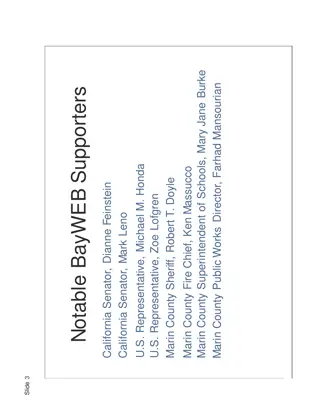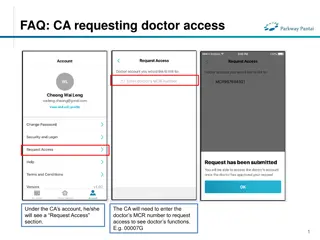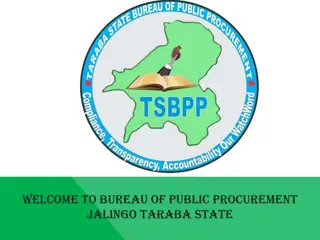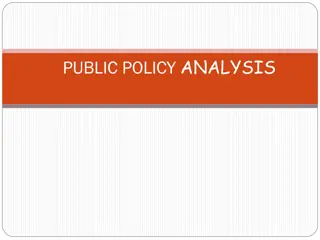Information Commissioner's Role in Bermuda's Public Access to Information
The Information Commissioner in Bermuda plays a crucial role in promoting public access to information, ensuring compliance with the PATI Act, and safeguarding the right to access public information. This independent office provides guidance to public authorities, oversees enforcement activities, and serves as the final authority on defining the scope of rights and obligations under the Act. Being accountable to independent authorities and the public, the Information Commissioner upholds transparency and accountability in government operations.
Download Presentation

Please find below an Image/Link to download the presentation.
The content on the website is provided AS IS for your information and personal use only. It may not be sold, licensed, or shared on other websites without obtaining consent from the author. Download presentation by click this link. If you encounter any issues during the download, it is possible that the publisher has removed the file from their server.
E N D
Presentation Transcript
INFORMATION INFORMATION COMMISSIONER S BRIEFING COMMISSIONER S BRIEFING Wednesday, 11 March 2020 Royal Hamilton Amateur Dinghy Club
AGENDA AGENDA Introductions to the ICO Proactive Publication Part 2 of the PATI Act 10:15 10:30 Break 10:30 11:25 PATI Requirements for Statutory Boards and Committees 11:25 11:30 Wrap-up and Evaluations 9:00 9:15 9:10 10:15
The Public Access to Information Act The Public Access to Information Act A promise that Bermuda would be a place where government operates in the sunshine of public scrutiny .
Purposes of PATI Act (section 2) Purposes of PATI Act (section 2)
The Information Commissioner The Information Commissioner An independent public office mandated to promote public access to information.
Information Commissioner fulfils mandate by: Information Commissioner fulfils mandate by: Promoting awareness of the rights Providing guidance to public authorities Overseeing compliance with the PATI Act s requirements, through compliance and enforcement activities
Information Commissioner: Information Commissioner: Independent of Government and political parties Not subject to the direction or control of external persons Avoids the appearance of bias, favour, partiality or self- interest Accountable to other independent authorities (Auditor General and Judiciary) and the public (tabling of reports and statement of operations)
Information Commissioners Role Information Commissioner s Role Safeguard and promote the right to access public information, taking into consideration the provisions of the PATI Act Define the scope of the right to access case-by-case Final authority on scope of rights and obligations under the PATI Act prior to judicial review
Information Commissioners Approach Information Commissioner s Approach Independence, integrity, and fairness Progressive approach to oversight and enforcement Seek to add value to the PATI process for all stakeholders
Topics for today Topics for today Proactive publication PATI requirements for statutory boards and committees
PATI Act achieves its purposes in 2 ways: PATI Act achieves its purposes in 2 ways: The right to make a PATI request, and Proactive publication (public authority makes information readily available)
Transparency by design is beneficial Transparency by design is beneficial to the public: to the public: Information-age, expectation of information at our fingertips Want information in usable format
Also beneficial to the public authorities: Also beneficial to the public authorities: Moving into digital and customer-focused services Builds trust and transparency into public services (e.g., Open Data Committee) Can reduce requests for information
An information statement is an important tool to help the public understand what a public authority does, what records it holds, and how the public can access those records.
An information statement must contain (s.5): An information statement must contain (s.5): Description of structure and organisation List of relevant legislation Description of functions, power, and duties, including ongoing programs
An information statement must contain (s.5): An information statement must contain (s.5): Description of types of records held Description of manuals, decision making policies, rules and guidelines Name and contact information for Information Officer
Good news! Good news! Once the information statement is completed, it only needs to be reviewed annually (or more often as needed) to keep the details updated.
Other information required to be provided (s.6): Other information required to be provided (s.6): Log of PATI requests and outcomes (without any requester s details) Quarterly expenditures Details of contracts for goods or services with a total value of $50K or more Public officers salary ranges
Role of Information Commissioner (ss.7 Role of Information Commissioner (ss.7- -9): 9): Provide guidance and encouragement Review to proactive publication for compliance with the PATI Act Authority to order a public authority to comply with requirements
What other information could be published? What other information could be published? Responses on 2019 ICO Annual Returns Responses on 2019 ICO Annual Returns
The idea of transparency by design and The idea of transparency by design and proactive publication both arise out of proactive publication both arise out of the generally accepted idea that the generally accepted idea that government openness is important to government openness is important to building trust with the public and to building trust with the public and to empowering citizens. empowering citizens.
PATI requirements for PATI requirements for statutory boards and committees statutory boards and committees
Schedule to the PATI Act defines public authorities: Schedule to the PATI Act defines public authorities: Named public authorities Government departments Local governments and parish councils Paragraph 13 statutory body carrying out government or quasi-governmental functions
Schedule to the PATI Act defines public authorities: Schedule to the PATI Act defines public authorities: Paragraph 14 owned or controlled by Government Paragraph 14 substantially funded by Government
Questions about status under the Schedule: Questions about status under the Schedule: First arose in 2015 and have arisen on occasion since then Resolved through informal or formal communications using ICO s progressive approach to enforcement
Requirements for statutory bodies under the PATI Requirements for statutory bodies under the PATI Act are the same as for all public authorities: Act are the same as for all public authorities: Duty to publish Duty to respond to PATI requests Duty to assist
Benefits to statutory boards and committees: Benefits to statutory boards and committees: Transparency and accountability encourage better decision making encourage reflection and ongoing improvement build public trust in the public authority, and encourage innovation in response to reforms and cultural changes
Structure and resources to support PATI practice: Structure and resources to support PATI practice: Leadership Basic awareness and sufficient resources that reflect scope of PATI responsibilities Guidances, practice codes, policies and procedures Clarity on records management
Resources for statutory boards and committees: Resources for statutory boards and committees: Duty to publish: ICO Annual Returns process identifies need for guidance and support ICO Guidance on Information Statements Practice Code sections on publication Inquiries, one-on-one assistance
Resources for statutory boards and committees: Resources for statutory boards and committees: Duty to respond to PATI requests: ICO website, guidances, briefing slides, decisions and inquiries GOB PSS (current) and future sections Minister s PATI Practice Code PATI Tracking System
Importance of the decision makers: Importance of the decision makers: Information Officer and Head of Authority Information Officer and Head of Authority
Information Officer and Head of Authority duties: Information Officer and Head of Authority duties: Locate records and decide what to release Manage the PATI request process Prepare and submit information statement Prepare and submit ICO Annual Return Listed in full in Practice Code
Considerations when selecting an Considerations when selecting an Information Officer: Information Officer: Practice Code outlines competencies Who do you want making your PATI decisions? Is reputational risk appropriately managed? Who is familiar with the records and work? What are the nature of the records generated by the public authority?
Other possible considerations for statutory boards Other possible considerations for statutory boards and committees: and committees: Would a collaborative approach with a GOB department be appropriate? Do you have clarity on who holds the records? Where are the records stored? What happens to a PATI request if you meet monthly or quarterly?
The PATI Act is an opportunity for you to play a The PATI Act is an opportunity for you to play a role in the promotion of good governance and to role in the promotion of good governance and to be a part of broader reforms seeking to be a part of broader reforms seeking to strengthen the public sector. strengthen the public sector.
Wrap Wrap- -up up Learn more about Information Commissioner s decisions: Decisions published on www.ico.bm Monthly Roundups highlight learning lessons ICO Guidances published on www.ico.bm General questions for ICO at 543-3700 or info@ico.bm
INFORMATION INFORMATION COMMISSIONER S BRIEFINGS COMMISSIONER S BRIEFINGS 2020-2021 Schedule (to be announced)



